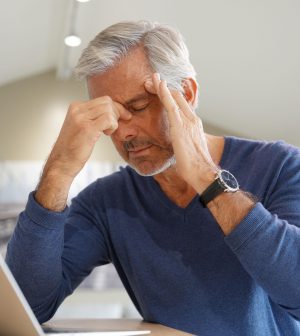- Could Your Grocery Store Meat Be Causing Recurring UTIs?
- Are You Making This Expensive Thermostat Error This Winter?
- Recognizing the Signs of Hypothyroidism
- 10 Strategies to Overcome Insomnia
- Could Artificial Sweeteners Be Aging the Brain Faster?
- Techniques for Soothing Your Nervous System
- Does the Water in Your House Smell Funny? Here’s Why
- Can a Daily Dose of Apple Cider Vinegar Actually Aid Weight Loss?
- 6 Health Beverages That Can Actually Spike Your Blood Sugar
- Treatment Options for Social Anxiety Disorder
Up to 4 Million Americans Out of Work With Long COVID

In yet another example of the financial toll that the new coronavirus has exacted during the pandemic, a new report estimates that up to 4 million Americans are out of work as they struggle with long COVID.
“This is a shocking number,” report author Katie Bach, a nonresident senior fellow at the Brookings Institute, told NBC News. “If this looks like other post-viral illnesses, some people will recover, but there will be this big stock of people who don’t, and it will just continue to grow over time.”
That reality could translate into at least $170 billion in lost wages a year, the report suggests.
Several surveys have tried to measure the impact of long COVID on employment.
The Federal Reserve Bank of Minneapolis estimated last month that 26% of people with long COVID were out of work or had cut their working hours as of mid-2021. Meanwhile, an international survey found that 22% of people with long COVID weren’t working because of their illness and 45% had reduced hours. And a U.K. survey found that 16% of people with long COVID had reduced hours and 20% were on paid sick leave between April and May 2021.
Long COVID can be hard to define, since symptoms are wide-ranging and can last months. Many suffer from fatigue, brain fog, joint or muscle pain, heart palpitations, chest pain, dizziness, menstrual changes or changes in their ability to taste or smell. In June, the U.S. Centers for Disease Control and Prevention published a study that found that 1 in 13 American adults and 19% of adults who have had COVID struggle with long COVID symptoms.
Under the Americans with Disabilities Act (ADA), long COVID is considered a disability.
“Some employers understand vaguely that this is a factor impacting the labor market,” Bach said. “That is very different from knowing that this is an ADA-protected condition and knowing what accommodations to give people.”
The Brookings report called for research into treatment options that could help people mitigate their long COVID symptoms. For now, some people go to clinics for supportive care such as physical therapy or breathing exercises.
More information
Visit the U.S. Centers for Disease Control and Prevention for more on long COVID.
Source: HealthDay
Copyright © 2026 HealthDay. All rights reserved.










